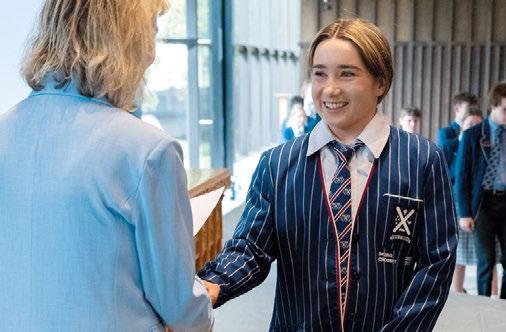
4 minute read
From the Rector
From
theRector
The start of the 2022 school year was certainly an unusual one, with new rules and regulations dictating a myriad of decisions to keep our community safe under the COVID-19 Protection Framework (Traffic Light System).
So many things were cancelled that are usually considered vital to our commitment to a holistic education – assemblies, sport and cultural pursuits, parent evenings, special events, weekend activities, and large gatherings, disappeared from the calendar and the campus ceased to be the usual hive of activity.
However, our students seemed undeterred and remained determined to make the most of things and were very grateful when co-curricular activities could resume halfway through the term. We are all very aware that there are many other times throughout St Andrew’s College history that school life has been disrupted. When the College opened on 17 March 1917, World War I saw many family members fighting overseas. The Great Depression followed, as did the sacrifice of lives throughout World War II. The 22 February 2011 earthquake, when four St Andrew’s College immediate family members lost their lives, and the resultant devastation to buildings and infrastructure, interruptions to learning, and the years of rebuilding, was another time when life ceased to continue as we had come to expect. However, history has shown us that these times teach us important lessons, amongst them to be grateful for opportunities we sometimes take for granted and to develop ways of being resilient, supportive of others, and value the community to which we belong.
Under Phase 3 of the CPF Red Traffic Light setting, our teachers and staff have led the way in making student learning and continued engagement with school a priority. Our commitment to deliver continuous learning programmes for all students has relied upon: • our continued sense of community and support of each other; • recognition that the greater good may sometimes influence decisions over personal preferences; • understanding the tension between competing priorities; • to remain focused on achieving of educational excellence in delivery.
Our Well-being programme, now in its sixth year, also helped us to pay attention to our personal resilience, drawing upon the tools and lessons learnt through chapels, assemblies, the Health curriculum, well-being speakers, programmes, and support networks.
Connection, communication, compassion, and co-operation, remain fundamental to who we are and what we do at St Andrew’s. I see this in action every day amongst our students. They remain optimistic despite the current challenges and are grateful for the opportunities they have. Watching them is inspiring and gives us faith that the world will perhaps emerge stronger than before as we readjust and find a new equilibrium.
We all know that change can be painful and difficult. Sometimes change is forced upon us and sometimes it is a deliberate choice, forging a new path. In today’s environment, many people recognise the value of co-education, although the debate between single sex and co-education remains at times a vigorous one. In March, on Founders’ Day, St Andrew’s celebrated a significant milestone from 30 years ago – the official launch of co-education with the opening of the new state-ofthe-art Senior College in March 1992. Dr John Rentoul, the Rector at that time, firmly believed in the benefits of co-educational schooling that led to the Board decision to take this first step in St Andrew’s admitting girls into the Senior College. In 1992, 55 girls made up 18 per cent of the 300 students in the Senior College. Today, the Senior College is home to 451 students with 42 per cent of them girls.
Seeing our students living and learning side by side, experiencing life’s lessons through success and failure, is a natural way for young people to develop. School learning and experiences must develop the skills, attitudes and character to adjust, adapt, and ride through the challenges of time. Built upon the firm foundation of our St Andrew’s College values of Truth, Excellence, Faith, Inclusivity and Creativity, and with our own experiences and lessons learnt from history, St Andrew’s College will continue to ‘Build Better People for Life’. A life that is co-ed.

Christine Leighton Rector
Rector’s Medal for Dr John Rentoul
(Rector 1982–1994)
When he served as Rector of St Andrew’s College from 1982–1994, Dr John Rentoul had a strong belief in the benefits of co-education, which led to the Board decision to take the first step to admitting girls into the Senior College in 1992. That year, Dr Rentoul also oversaw the official opening of the Rentoul Senior College (Years 12–13 ) with the entry of 55 girls. At the Founders' Day Assembly I was delighted to present Dr Rentoul with the Rector’s Medal, in recognition of his foresight and the significant contribution he has made to St Andrew’s College.
I believe the well-known quote from Ralph Waldo Emerson, ‘Do not go where the path may lead, go where there is no path and leave a trail’, epitomises the vision of Dr Rentoul. I feel fortunate to have followed in his footsteps, having had the opportunity to further develop co-education at St Andrew’s College.
Celebrating 30 years of

A group of the First Girls to study at St Andrew’s after it became co-educational, gathered for a photograph with their children who now attend the College.











